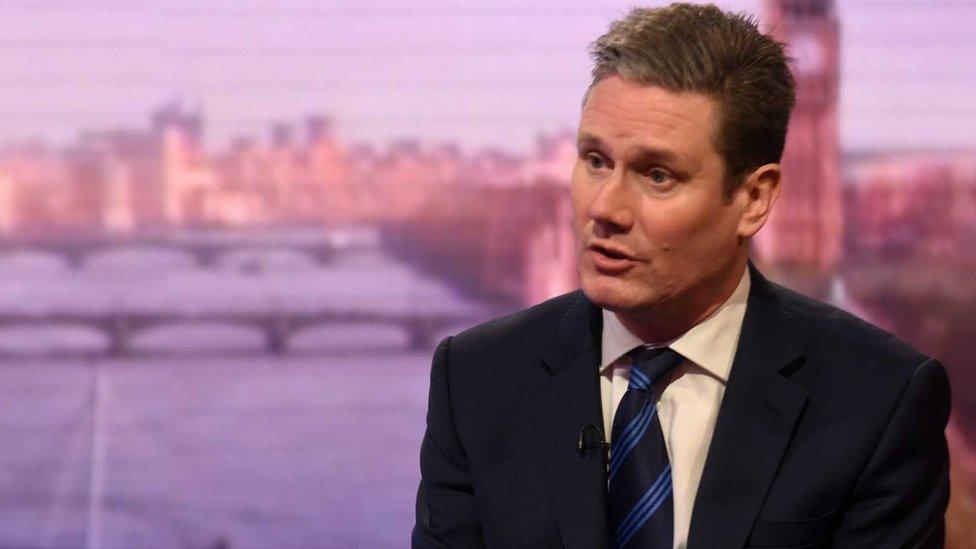Is Labour's Brexit plan too subtle?
- Published
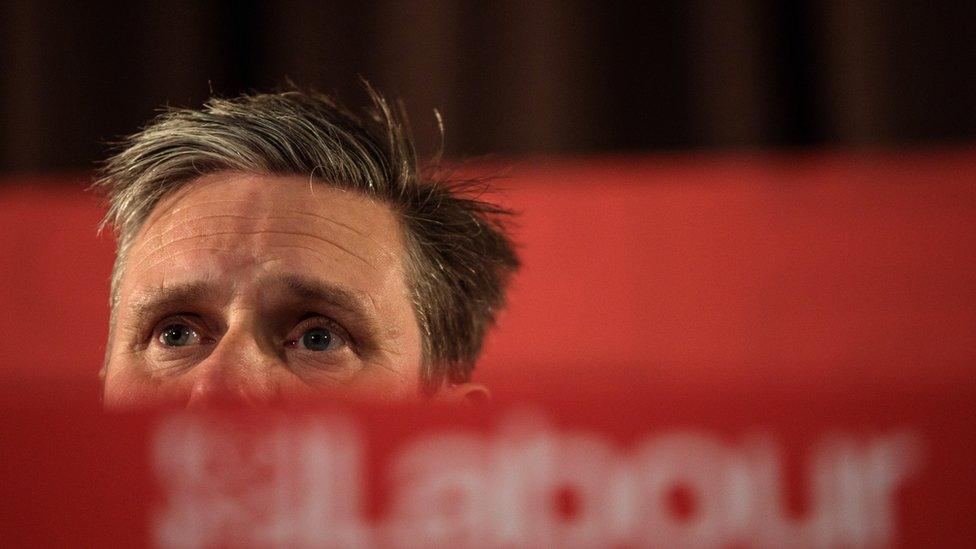
Sir Keir Starmer: "A brain the size of China"?
If in years to come, students are asked an essay question - Is Nuance an Effective Weapon In Politics? - they might cite Labour's position on Brexit in 2017 in their answer.
As things stand, with the party trailing in the polls, it would appear that if it is a weapon at all, it's been decommissioned.
On the surface, Labour has a difficult task. It has to attract - or at least not repel - those Labour voters that backed Leave in last year's EU referendum, as well as those who backed Remain.
The Liberal Democrats - starting from a low base - need only to attract a small percentage of the 48% who voted Remain to improve their representation in Parliament.
So campaigning to reverse the result of the referendum - by having a second one - carries little political risk for them.
The Conservatives can pretty much go hammer and tongs for the UKIP vote by saying they can deliver on Brexit - and achieve sympathetic headlines from some of the tabloids as a bonus.
Primary colours
Labour has a trickier balancing act to perform but some in the party's ranks wonder if their frontbench isn't making the issue more difficult for itself than it need be.
Shadow Brexit Secretary Sir Keir Starmer set out Labour's position to an audience of successful business people, professionals, lobbyists and one or two trade unionists today, the vast majority of whom were Remainers.
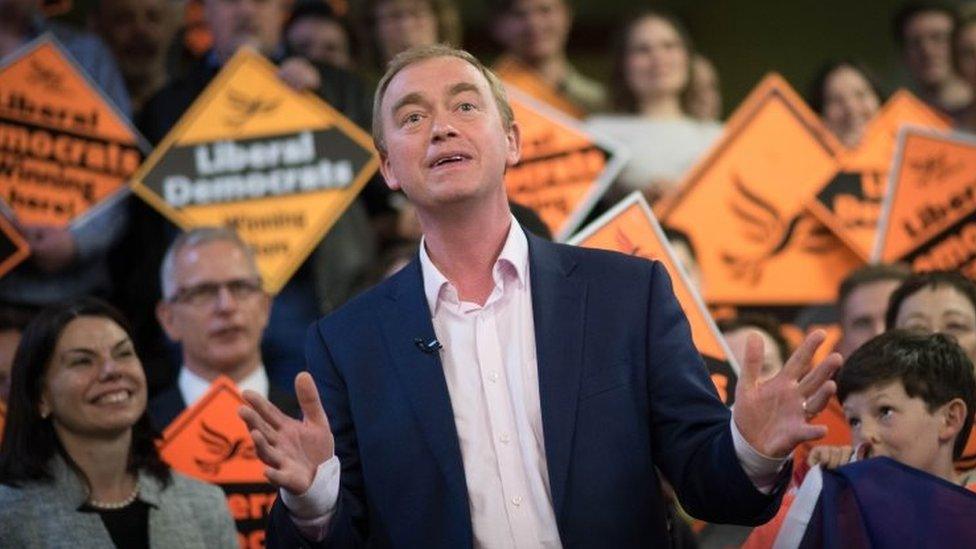
Tim Farron has nothing to lose by promising second referendum
Sir Keir tried to emphasise the differences between Labour and the Conservatives - Labour would prioritise trade with the EU; it might stay in the customs union; it would give EU citizens a unilateral guarantee that they could stay on in Britain; and, symbolically, it would ditch the Great Repeal Bill and emphasise the continuation of EU rights post-Brexit.
But some in the audience were privately worried that the differences with the Conservatives were too subtle.
General election campaigns are painted in primary colours, not in shades of grey.
Legal mind
Sir Keir ruled out a second referendum because he said Labour had to "genuinely" accept the referendum result but also, for practical reasons, he felt there would have to be transitional arrangements at the end of the two-year Article 50 process so the final nature of any deal might not be apparent for six years.
Now when Sir Keir was introduced, his audience of achievers were informed that he had a "brain the size of China".
But some who heard him speak - while not doubting the Asiatic extent of the former Director of Public Prosecutions' legal mind - privately wondered whether his political nous was more in the Luxembourg or Monaco range.
Because while a second referendum might not turn out to be practical, signalling a willingness to hold one might rally Remain votes to Labour and create a far less subtle divide between his party and the Conservatives.
And while many in the audience like and sympathised with him - so much so that one of them confided that he had refrained from asking a difficult question - they were keen for more clarity.
The shadow Brexit secretary told them that he would put jobs and the economy first.
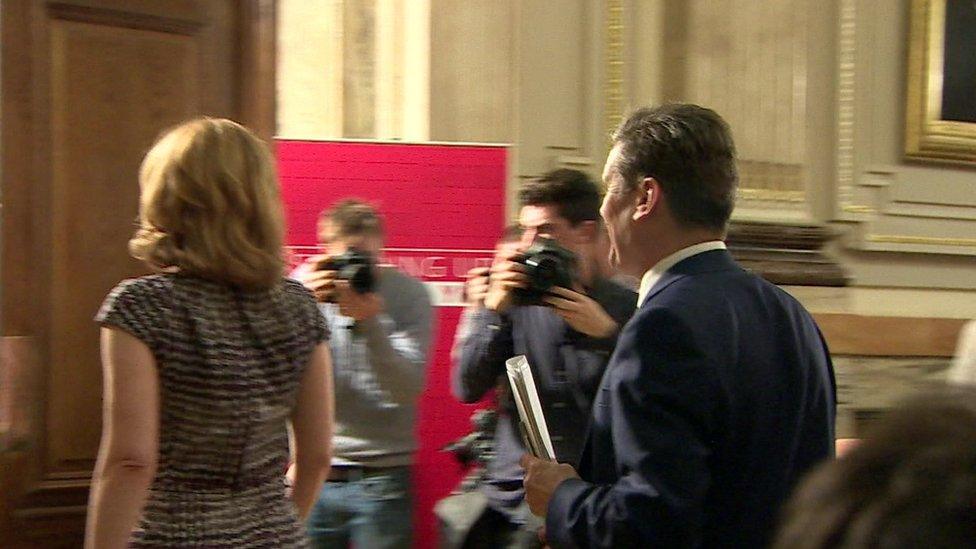
Sir Keir Starmer left some in his audience wanting more
He said immigration shouldn't be the "over-arching" concern in negotiations. But he also insisted that free movement would end when Britain left the EU.
He was asked by Sir Roger Lyons - a former union leader - what was wrong with the "Norway model" - a country outside the EU which has traded free movement for single market access.
That would indeed involve putting the economy before control of immigration.
Free movement
Sir Keir said that what works for Norway wouldn't necessarily work for the UK. He preferred a bespoke deal.
He then made clear that migration was a key concern after all: "We must listen to what people tell us about immigration."
It was only in an interview with the BBC's John Pienaar that he indicated that negotiations to achieve a good trade deal with the EU might involve discussion of free movement of labour (not of all people, as at present).
In other words, the freedom of EU citizens to move to take up offers of work.
But this wasn't said loudly and proudly in the speech itself.
So not only some in the audience but former - and even two current frontbenchers - have been questioning privately whether the party's message should be more robustly opposed to Mrs May's apparent Brexit strategy, and should be more explicit about a route back to the EU if negotiations go badly.
Some of them have read an analysis by polling expert Professor John Curtice, which concluded: "Most of those who voted Labour in 2015 - including those living in Labour seats in the North and the Midlands - backed Remain.
"The party is thus at greater risk of losing votes to the pro-Remain Liberal Democrats than to pro-Brexit UKIP."
But for now the strategy, if not all the detail, is clear - the desire to appeal to Leave voters on immigration and jobs, and to Remainers in vying to enjoy a close partnership with the EU and as many of the benefits of the single market as possible.
That requires a nuanced message. So that essay question will be definitively answered in this election.
But with Labour's campaign messages emphasising public services, the NHS, and the economy - and their determination not to allow this to be a "Brexit election" - I suspect the party's strategists already know the answer.
- Published25 April 2017
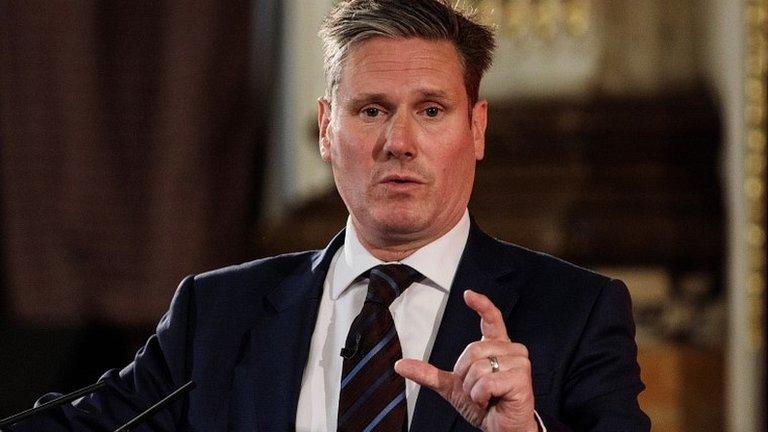
- Published25 April 2017
